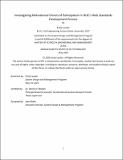Investigating Motivational Drivers of Participation in W3C’s Web Standards Development Process
Author(s)
Lauber, Emily
DownloadThesis PDF (5.685Mb)
Advisor
Rhodes, Donna H.
Terms of use
Metadata
Show full item recordAbstract
This research investigates the motivational drivers for companies and individuals to participate in the World Wide Web Consortium’s Web standards development process. Motivational drivers are identified through a literature review, primary sources, and interviews. Thirteen semi-structured interviews were conducted with questions related to participants’ experience with the World Wide Web broadly, Web standards in general, the organization of W3C, and game modeling of the process. W3C was selected as the case study of Web-related standards bodies because of its unique model of paid membership yet open standards available royalty-free. The W3C standards process requires consensus-building, horizontal review, and proof of implementation before the organization officially recommends the specification. Existing research documents the history and value of standardization across industries, the modeling of various Standards Development Organizations (SDOs) in information industries, and the negotiation of international Internet governance. This thesis does not attempt to prove a societal benefit of Web standards but instead focuses on an individual’s belief in societal benefit and how that belief drives their engagement with W3C.
Initial findings point to members seeking economic, philosophic, and moral value through participation in Web standards development. A game theory framework evaluates the economic value of different players within the ecosystem and identifies that Web browser vendors and long-time consortium members have greater power for their preferred specification outcomes than Web developers or newcomers. Despite changes in the Web ecosystem in the past 30 years, W3C members continue to be drawn to the Web for the same philosophical intents that Sir Tim Berners-Lee designed the Web for. There are shared concerns though that the economic power players identified in the game modeling has damaged or will threaten the philosophy of an open, safe, accessible Web. Interviewees shared personal beliefs that there was a moral responsibility to engage in Web standards development and enable W3C’s mission of “empowering humanity”. Further research is required to catalogue more motivational drivers, evaluate drivers across other Web-related Standards Development Organizations, and rank the priority of motivations when the different drivers are in tension.
Date issued
2025-05Department
System Design and Management Program.Publisher
Massachusetts Institute of Technology